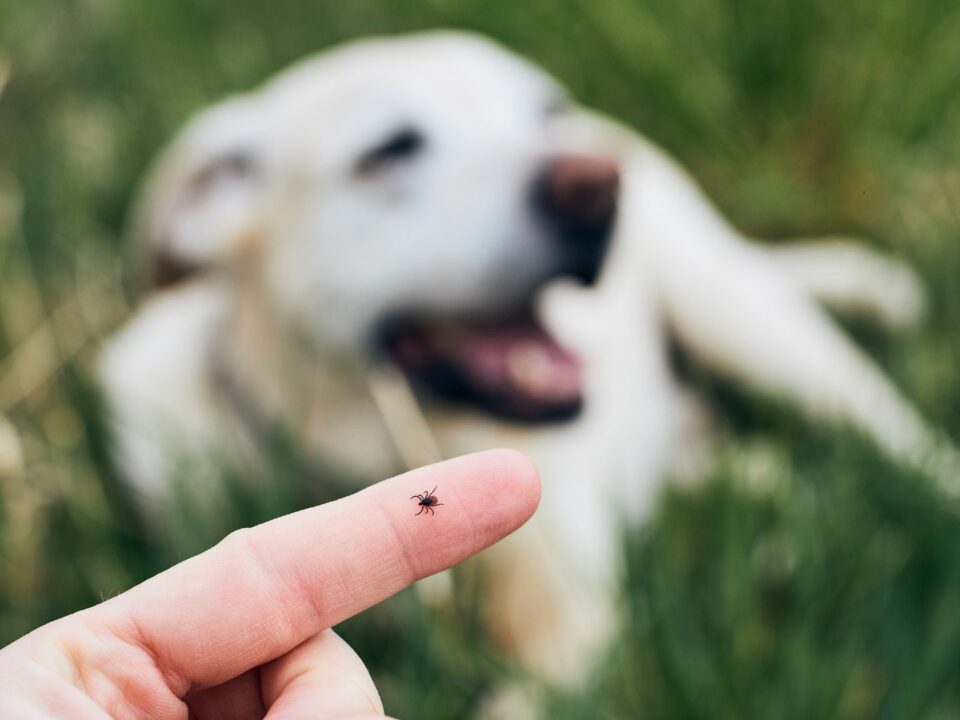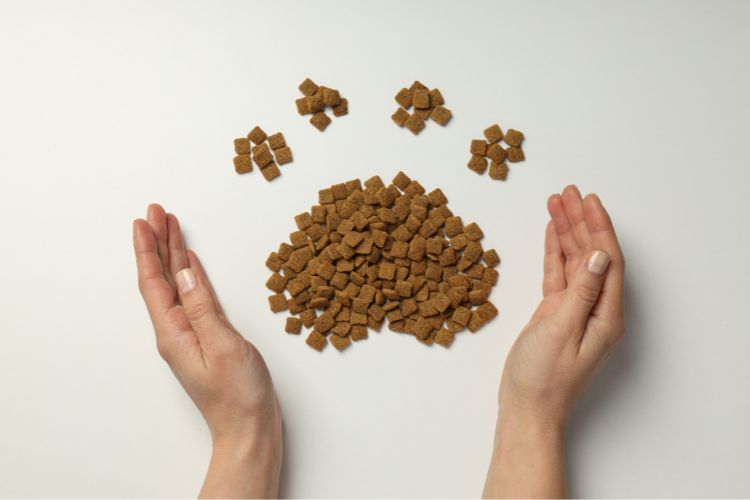
Our Top 5 Tips For A Great Vet Visit With Your Dog
June 6, 2024
How to Remove a Tick from Your Dog
August 20, 202410 Surprising Foods Your Dog Can Safely Enjoy
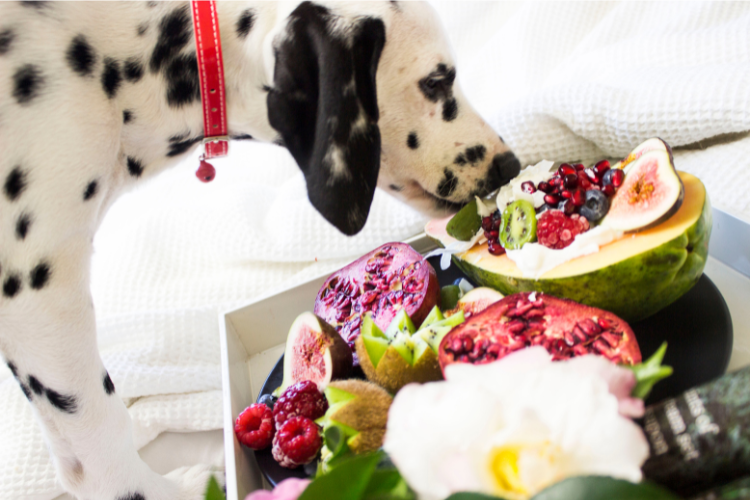
The food we give our dogs plays an essential role in their overall health, like improving their immune system, increasing their energy levels, controlling their weight, and maintaining good muscle condition.
What may surprise you is that many things we consider human foods can be healthy additions to your dog’s diet, providing valuable vitamins, nutrients, amino acids, and minerals. Some of the foods we’ll discuss can be included as part of your pet’s meals or as treats.
It’s important to understand that the stomachs, digestive systems, and organs of dogs are different from those of humans. Some foods that are healthy for us can be toxic to your pooch, so our recommendation is if you’re not sure, don’t feed it to your dog until you double-check with your vet.
Before we start, here are some foods you should NEVER feed your dogs:
- Onions and garlic
- Chocolate
- Cooked bones
- Grapes, raisins, sultanas
- Avocado
- Anything containing caffeine or alcohol
- Raw macadamia nuts
- Cherries, peaches, or any fruit with a large seed or pip
- Citrus fruits
- Most seasonings.
These foods can cause a range of issues from diarrhoea to kidney failure and seizures, so they are a big no-no for your pooch.
Now let’s have a look at some human food you can feed to dogs. While the food below is usually safe for dogs, we highly recommend discussing any dietary changes with your vet.
1. Cooked Eggs
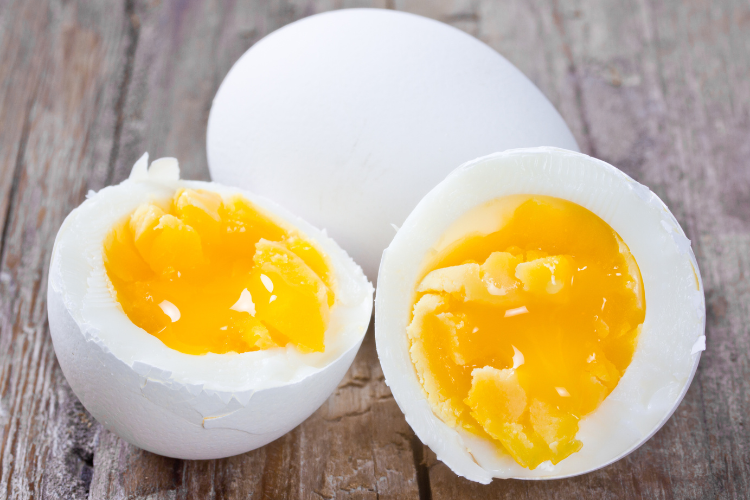
Cooked eggs can be a great way to provide your dog with protein, vitamin B12, iron, folate, and more. This all contributes to healthy muscles and good digestion while helping your dog feel fuller for longer.
Giving your dog cooked rather than raw eggs removes the risk of salmonella. Hard-boiled, poached, or scrambled eggs are all great options for your dog, just don’t add extras like cream, milk, cheese, chives, or salt and pepper.
One egg is usually more than enough per day, and only a few times a week. Too much protein can lead to your dog putting on weight. When it comes to how much to feed your pet, dogs range in size, so chat with your vet about what they’d recommend for your specific dog.
2. Carrots
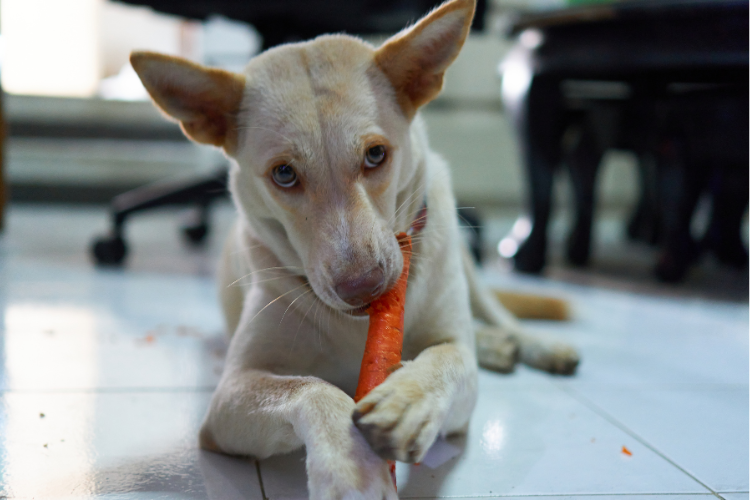
Canine dental health is often a neglected part of looking after a dog. Along with regular dental check-ups, feeding your dog carrots is a healthy way to remove plaque from their teeth.
If that wasn’t enough, carrots are also a good means of getting vitamin A in your dog’s diet, which is great for your furry friend’s coat and immune system.
3. Apples
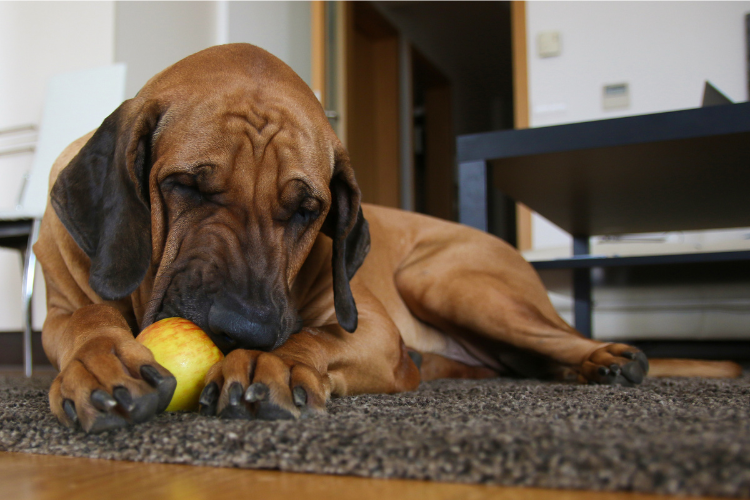
We can’t guarantee an apple a day will keep the vet away, but it’s a great source of vitamin A, vitamin C, and dietary fibre.
Always remove the seeds and core before giving your dog an apple as both of these can be choking hazards.
4. Green Beans
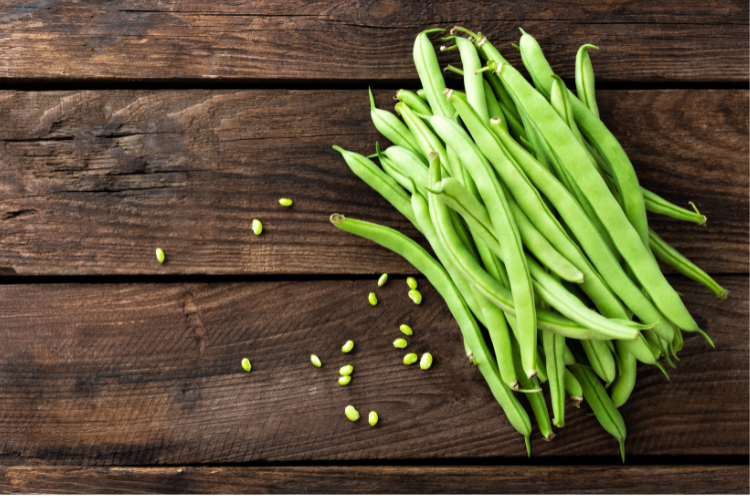
Green beans are another healthy snack option for your dog. Raw or cooked beans are a good source of protein, calcium, iron, and vitamin K, all while being low in calories.
Before serving, cut the green beans into manageable pieces for your dog, especially if they’re a smaller breed. Avoid seasoning the beans and ensure you don’t serve them up too hot. Peas are another green your pet can enjoy if green beans aren’t available.
5. White Rice
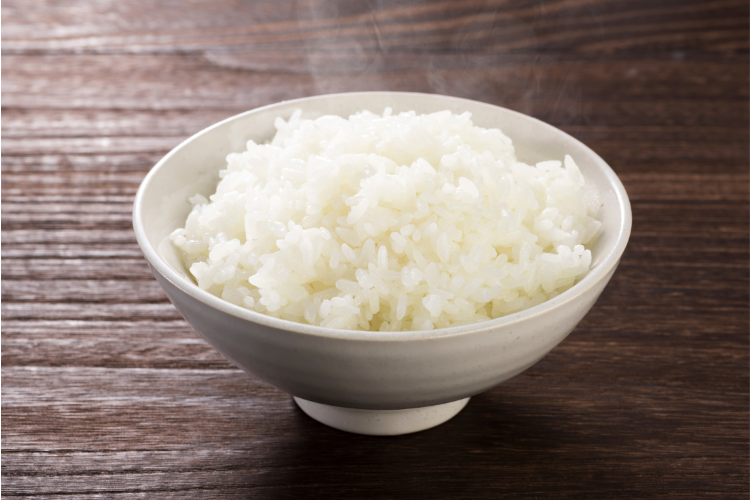
Cooked white rice can be a great meal for dogs with an upset stomach or diarrhoea. It’s both easy to digest and can help bind stool.
White rice can cause blood sugar levels to rise, so if your dog has diabetes, stick to a small portion only.
Serve the white rice unseasoned and allow it to cool down before serving it to your dog. You don’t want their enthusiasm to lead to a burnt mouth.
6. Dairy Products
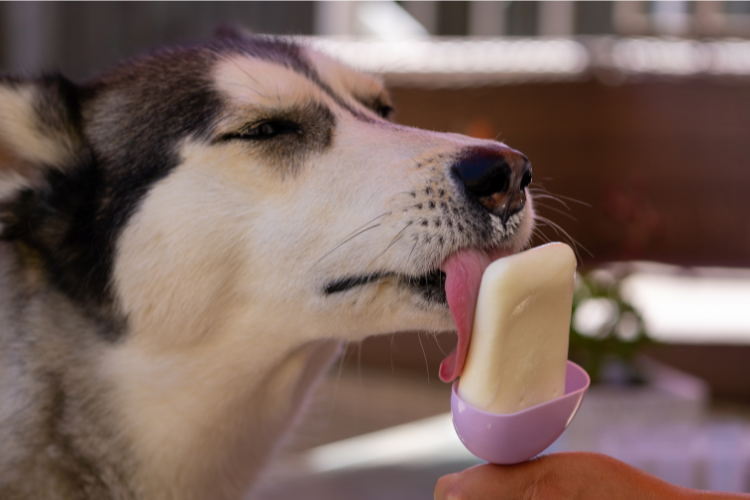
In small quantities, dairy products like cottage cheese, milk, and plain yogurt can be safe for your dog. Remember that a lot of dairy products contain added sugar, so try to find the plainest versions of these foods you can.
If your dog vomits or gets diarrhoea after eating dairy products, it could be a sign they’re lactose intolerant, and you should stop giving them these foods.
7. Blueberries, Bananas, and Watermelon
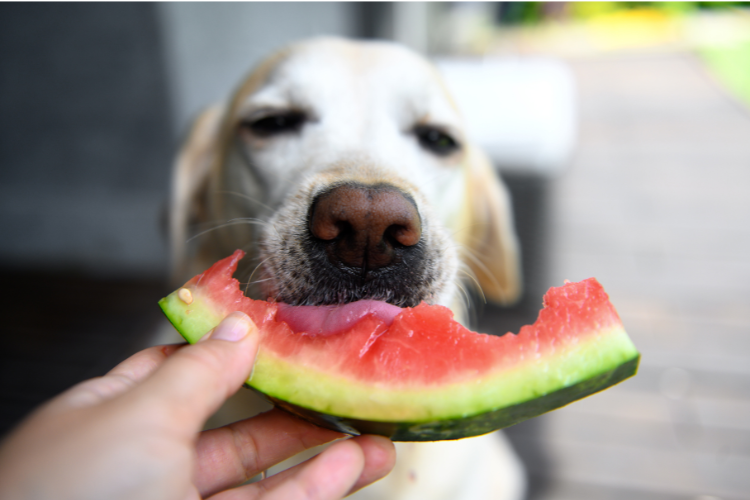
Blueberries are not only safe to feed your dog, they’re high in fibre, phytochemicals, and antioxidants. Bananas are also full of fibre and also include potassium, which is great for your dog’s bones.
Watermelon is yet another fruit that dogs can eat. They might be partial to some strawberries or other berries too. Just remember to remove the seeds and rind from any fruit as both can cause digestive issues.
Fruits can contain a high level of sugar, so moderation is key to keeping your dog’s weight and blood sugar under control. Think of fruit as an occasional treat, more than something to include in every meal.
8. Peanut Butter
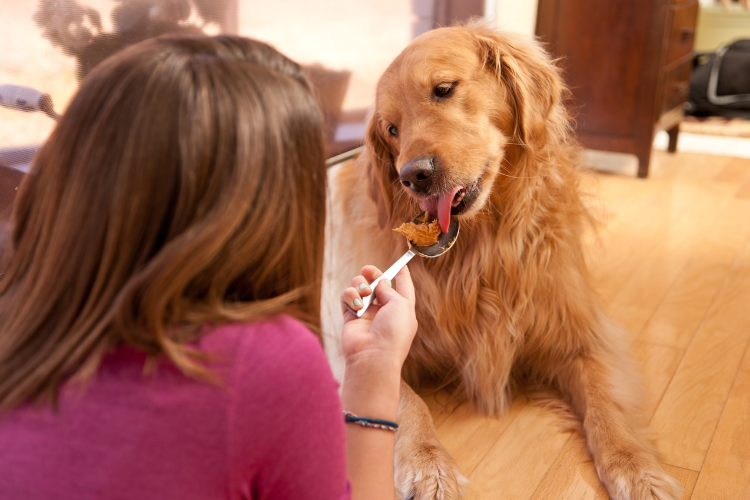
From our experience, dogs love peanut butter, and it can be a delicious treat so long as you take a few precautions. First, make sure your chosen brand contains no added salt or sweeteners.
Second, peanut butter provides your dog with healthy fats and protein, but too much of either will lead to weight gain. It’s best to give your dog peanut butter in small doses.
Last and most importantly, you need to make sure the peanut butter you purchase does not contain a sweetener called xylitol. While safe for humans, it is highly toxic to dogs. If your dog eats some, it needs to see a vet immediately, so it’s essential to check the ingredients first.
9. Pumpkin
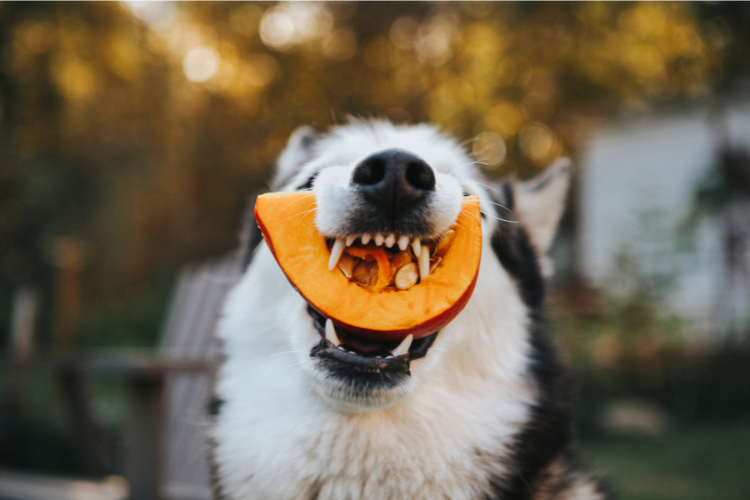
Pumpkin can be a great way to help with digestive issues your pup is having. Along with being rich in fibre, pumpkin contains vitamins A, C, and E.
If buying canned pumpkin, make sure it is just a pumpkin and not a pumpkin filling that may have added sweeteners, such as xylitol like we just mentioned above. It is possible to give your dog too much fibre, especially if they aren’t used to it. Introduce pumpkin into a dog’s diet gradually, so their stomachs can adapt.
10. Fish
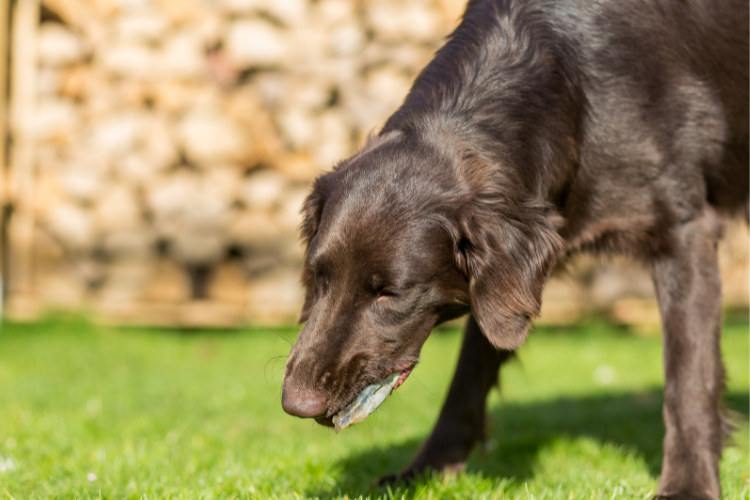
Though we tend to think of cats as being seafood lovers, prawns and fish, such as salmon or tuna, can be a great source of protein for your pooch. Fish is also a fantastic source of omega-3 fatty acids, which is great for their immune systems and helps keep their coats looking great.
Always cook your fish before serving it, as raw fish can contain parasites that can wreak havoc on your dog’s digestive system. It’s also crucial to make sure there are no bones in the fish before serving it. Also, like with any other meat, don’t season it for your dogs.
The List Goes On
Your dog might also like to try sweet potatoes, oatmeal, pork, chicken, turkey, spinach, honey, broccoli, mango, and even quinoa.
Along with quality dog food, feeding your dog some human foods can have nutritional benefits for them. Remember a balance of foods in moderation is key to keeping your furry friend healthy and feeling great.
Just like humans, different dogs will have their own unique needs, allergies, and underlying conditions.
We highly recommend running any dietary changes by your vet, especially if your pooch has any underlying health conditions such as diabetes, stomach issues, or immunity problems. For help on creating the best diet for your dog, talk to our expert team today.
Rossmore Vet is Here For You and Your Pet

Rossmore Vet Hospital has been looking after animals big and small for over 35 years, and our passionate, experienced team is here to help your pet. Whether you want advice on your pet’s diet, need emergency care or your pet’s vaccinations are due, our team offers a wide range of services and is dedicated to keeping your pet healthy and happy.
Book an appointment with our clinic today!


